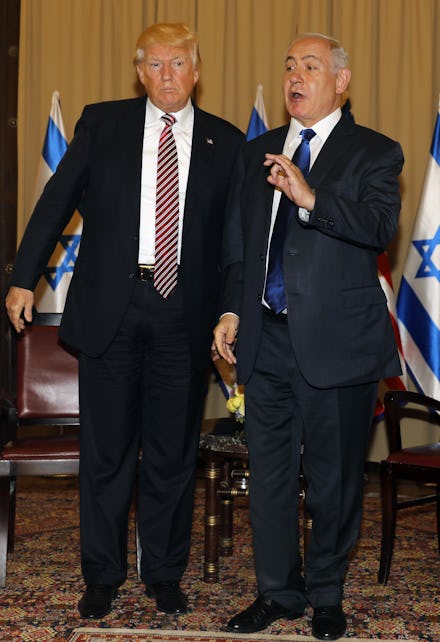Trump's Israel trip won't end the conflict with the Palestinians — it could make things much worse

Since dancing with swords and concluding a $110 billion arms deal with Saudi Arabia, President Donald Trump has shifted his focus to Israel and the West Bank. Trump has described bringing peace between Israelis and Palestinians as “the ultimate deal” and “something that I think is frankly, maybe, not as difficult as people have thought over the years.” The itinerary for his 28-hour visit to Israel and the West Bank, which began Monday, suggests that his trip will reinforce — or worsen — the status quo, rather than encourage the trust between Israeli and Palestinian leaders that is necessary to resume the peace process.
Trump is reportedly using his separate bilateral meetings with Israeli and Palestinian leaders to reiterate longstanding, bipartisan talking points — emphasizing during his various stops the unshakeable bond between the United States and Israel, assuring the Palestinian leader that the U.S. wants to support peace and security for Israelis and Palestinians, and underscoring the United States’ support for direct negotiations. Having Trump make these points in Israel is de rigueur, but it doesn’t move either side off its calcified positions.
Other potential messages woven into Trump’s trip could set back efforts to move toward any deal, much less an ultimate one.
Trump's speech at the Israel Museum, which houses many of Israel's most prized antiquities, took place in Jerusalem, which is the third rail of the conflict. By choosing a venue that serves as a backdrop to affirm the Jewish people's ancient connection to the land, Trump sent a message to the political and religious right in the United States and Israel that Israel is justified in retaining sovereignty over the areas captured in the 1967 Six-Day War, where Israeli settlements have proliferated over the past half-century. In the zero-sum lens through which the extremes on both sides approach the conflict, affirming Jews' ties to the land is employed to negate Palestinian claims to the same.
Trump's trip could harm his own chance to have an impact on the conflict if his controversial new ambassador to Israel, David Friedman — who arrived just one week ago — prevails upon his boss to make good on the campaign promise to move the U.S. Embassy from Tel Aviv to Jerusalem. If Trump goes beyond noncommittal statements about moving the embassy, he will regain the confidence right-leaning American Jews and Israelis but inflame tensions with Palestinians and throughout the region — with potentially calamitous and violent results.
Trump has also become the first sitting president to visit the Western Wall: previous presidents have bypassed a visit to the wall, Judaism's holiest site that is located in the part of Jerusalem captured by Israel from the Jordanians in 1967. Every U.S. government since 1948 has taken the position that the status of Jerusalem remains an issue to be resolved in final status negotiations to end the Israeli-Palestinian conflict. During the past week, senior administration officials (like national security adviser H.R. McMaster) have reaffirmed the policy, while others (like U.S. Ambassador to the United Nations Nikki Haley) have rejected it. By visiting the wall, which sits adjacent to one of Islam's holiest shrines, the Dome of the Rock, Trump will be viewed as putting a thumb on the scale on the highly contentious issue of Jerusalem.
In addition to undercutting the United States' ability to leverage its leadership to address the Israeli-Palestinian conflict, Trump does not appear to appreciate how his visit will play among the Israeli public. The White House undercut the positive message from Trump's visit to Israel's national Holocaust memorial museum, Yad Vashem, by announcing it would be limited a 15-minute wreath-laying ceremony — a politically ill-conceived brevity, given both his statement in January on International Holocaust Remembrance Day that failed to mention Jewish victims, and White House press secretary Sean Spicer's ludicrous statement that Syrian President Bashar Assad was worse than Adolf Hitler because Hitler didn't use chemical weapons on his people (he did, of course).
The maelstrom unfolding in Washington over the Russia investigation, the James Comey firing and Trump's reckless decision to share sensitive Israeli-provided intelligence about the Islamic State group with the Russian foreign minister and Russian ambassador to the U.S. in their Oval Office troika doesn’t help either. When Israeli intelligence services share highly classified information with its closest ally, they do so with the expectation that U.S. officials will treat the intelligence appropriately — which does not include passing it along to a third country, especially Russia, given Israel's and Russia's divergent interests in Syria, due to Assad's backing of Hezbollah and Russia’s backing of Assad.
Visiting Israel and the West Bank just days before the 50th anniversary of the Six-Day War could have provided a ready-made opportunity for Trump to call for reflection among both Palestinian and Israeli leaders that might have catalyzed a return to the negotiating table. Trump is squandering that opportunity — which is why his braggadocio about resolving the Israeli-Palestinian conflict should be taken with a Dead Sea's worth of salt.